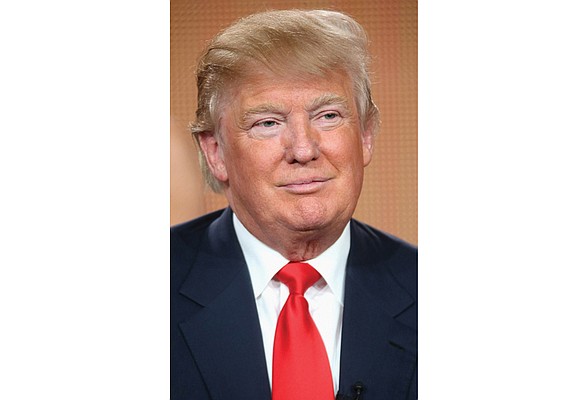Trump and the rise of hate groups
8/18/2017, 2:01 a.m.
By Reginald Stuart
President Trump’s tepid initial comments about the civil disruption last weekend in Charlottesville, followed by his declaration Tuesday that the “alt-left” was as responsible for the violence, has stirred a hornet’s nest of exchanges from a wide range of religious, political and social figures with no end of the bitter rhetoric in sight.
The ranks of congressional leaders, business executives, educators and social and civil rights advocates have risen day by day since last weekend, all sounding united in their criticism of President Trump and his sentiment supporting white supremacists. They say his response to and assessments of the violent clashes are adding kerosene to a fire started by a small, loosely knit but growing band of white nationalists.
“President Trump just can’t bring himself to unequivocally condemn and repudiate white supremacy and its modern-day equivalent, the ‘alt-right,’ ” said Richard Cohen, president of the Montgomery, Ala., based Southern Poverty Law Center, echoing a wide range of people across the social and political spectrum.
“He can’t bring himself to acknowledge that terrorism committed by white supremacists is, indeed, terrorism,” Mr. Cohen said. “The president’s tepid response ... to the deadly violence in Charlottesville was telling. He denounced the hate and violence but spread the blame to many sides.”
The president reasserted his position Tuesday in a contentious exchange with news reporters in New York. During the gathering, he rejected the bipartisan criticism about his initial responses to the Charlottesville incident and claimed “alt-left” counterprotesters were “very, very, very violent” when they confronted white nationalists, Ku Klux Klan sympathizers and neo-Nazi groups that had gathered in Charlottesville ostensibly to protest the city’s planned removal of a statue of Confederate Gen. Robert E. Lee.
“So this week, it’s Robert E. Lee. I noticed that Stonewall Jackson’s coming down,” President Trump told reporters about the Confederate statues marked for removal. “I wonder, is it George Washington next week? And is it Thomas Jefferson the week after?” he commented. “You know, you really do have to ask yourself, where does it stop?”
The SPLC has been “flooded” with calls since last weekend’s sudden outburst of violence, the kind that stirred memories of violence across the South in the days of racial segregation, said a spokesperson for the SPLC. The spokesperson said such violence and President Trump’s response only “energizes” white supremacists and their cohorts.
The violence in Charlottesville may have stirred many frightening memories of the Old South. Yet it also helped reinforce claims by hate fighters like the SPLC that President Trump’s victory has given an added spark to the right wing white nationalist movement.
The presence on President Trump’s top staff of alt-right political activist and Richmond native Steve Bannon and others gives the critics’ claims more validity, according to Trump critics of all political persuasions.
“The radical right was more successful in entering the political mainstream last year than in half a century,” said Mark Potok, a senior fellow at the SPLC.
“Trump’s run for office electrified the radical right, which saw in him a champion of the idea that America is fundamentally a white man’s country,” Mr. Potok said in a detailed statement issued earlier this year characterizing 2016 as the “Year in Hate and Extremism.”
“The reaction to Trump’s victory by the radical right was ecstatic,” he said, citing speeches and writings by Trump boosters hailing the president’s November 2016 election as a victory for those who feel white is right.
That declaration by Trump supporters was validated as the president appointed numerous people to high federal posts who have espoused negative views about African-Americans, women, Jews, members of the LGBTQ community, the poor and immigrants.
Saturday’s burst of violence in Charlottesville, rooted in white nationalist sentiment, was the latest demonstration of what Mr. Potok and his peers and adversaries say may be ahead for America, absent a dramatic shift by President Trump.
The events also have sparked heightened interest in “Intelligence Watch” and “Hatewatch,” two efforts of the SPLC.
“Intelligence Watch” is a team of lawyers and researchers who seek to identify, expose and legally root out people the center defines as white nationalist advocates and supporters of white separatists ideologies. Hatewatch is a quarterly newsletter the SPLC publishes identifying groups that fit into those categories.
Hatewatch has identified half a dozen Virginia organizations on its most recent list of more than 900 hate groups across the country. The strength in numbers or finances of such groups currently operating in Virginia is not known. However, the SPLC released the names of the organizations and their focus.
The “Loyal White Knights of the Ku Klux Klan” was identified as being based in Richmond. The “Rebel Brigade Knights True Invisible Empire” was reported based in Martinsville.
The “Christian Action Network,” described as an anti-Muslim group, was reportedly based in Forest, a community in Bedford and Campbell counties. “HIS Press” was identified as a Norfolk group promoting “radical traditional Catholicism.” “Act for America” was identified as a Virginia Beach-based, anti-Muslim group.
The Hatewatch report also referenced several Virginia-based foundations it felt were involved in racial supremacy activities.






